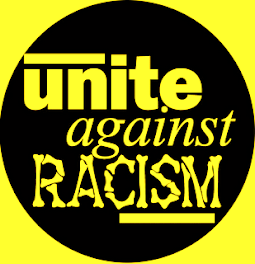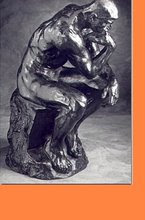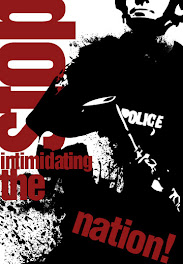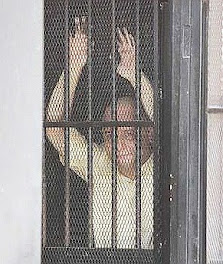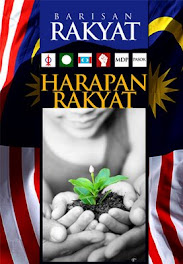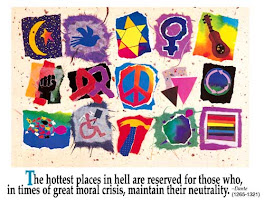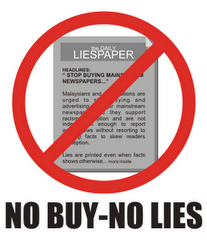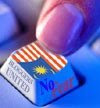Fine words indeed, these words now need to be translated in to actions by all the governments of the world!
- "The religious convictions that we hold in our hearts can forge new bonds among people, or tear us apart. The technology we harness can light the path to peace, or forever darken it. The energy we use can sustain our planet, or destroy it. What happens to the hope of a single child - anywhere - can enrich our world, or impoverish it."
- "I believe that the people of the world want this future for their children. And that is why we must champion those principles which ensure that governments reflect the will of the people. These principles cannot be afterthoughts - democracy and human rights are essential to achieving each of the goals that I have discussed today."
- "Because governments of the people and by the people are more likely to act in the broader interests of their own people, rather than the narrow interest of those in power."
- "The test of our leadership will not be the degree to which we feed the fears and old hatreds of our people. True leadership will not be measured by the ability to muzzle dissent, or to intimidate and harass political opponents at home. The people of the world want change. They will not long tolerate those who are on the wrong side of history."
- "This assembly's Charter commits each of us, and I quote - "to reaffirm faith in fundamental human rights, in the dignity and worth of the human person, in the equal rights of men and women.""
- "Among those rights is the freedom to speak your mind and worship as you please; the promise of equality of the races, and the opportunity for women and girls to pursue their own potential; the ability of citizens to have a say in how you are governed, and to have confidence in the administration of justice. For just as no nation should be forced to accept the tyranny of another nation, no individual should be forced to accept the tyranny of their own government."
- "Developing nations must root out the corruption that is an obstacle to progress - for opportunity cannot thrive where individuals are oppressed and business have to pay bribes. That's why we will support honest police and independent judges; civil society and a vibrant private sector. Our goal is simple: a global economy in which growth is sustained, and opportunity is available to all."
- "And I pledge that America will always stand with those who stand up for their dignity and their rights - for the student who seeks to learn; the voter who demands to be heard; the innocent who longs to be free; and the oppressed who yearns to be equal."
it was enlightening and heartening to listen to President Osama speak live at the UN
Fine words indeed, however these noble words need to be translated in to affirmative and sincere actions by all the governments of the world.
The time for shadow plays, lip service and bigotry is over!
Malaysia too needs to change and follow all the principles for good governance as outlined in President Obama's statement to the UN General Assembly.
Please take time to read and digest what Barack Obama said.
Barack Obama's UN general assembly speech in full (the links are to articles in the Guardian newspaper, UK).
Statement by Barack Obama at the UN general assembly, full text:
Mr President, Mr Secretary-General, fellow delegates, ladies and gentleman: it is my honour to address you for the first time as the forty-fourth president of the United States. I come before you humbled by the responsibility that the American people have placed upon me; mindful of the enormous challenges of our moment in history; and determined to act boldly and collectively on behalf of justice and prosperity at home and abroad.
I have been in office for just nine months, though some days it seems a lot longer. I am well aware of the expectations that accompany my presidency around the world. These expectations are not about me.
Rather, they are rooted - I believe - in a discontent with a status quo that has allowed us to be increasingly defined by our differences, and outpaced by our problems. But they are also rooted in hope – the hope that real change is possible, and the hope that America will be a leader in bringing about such change.
I took office at a time when many around the world had come to view America with scepticism and distrust. Part of this was due to misperceptions and misinformation about my country. Part of this was due to opposition to specific policies, and a belief that on certain critical issues, America has acted unilaterally, without regard for the interests of others. This has fed an almost reflexive anti-Americanism, which too often has served as an excuse for our collective inaction.
Like all of you, my responsibility is to act in the interest of my nation and my people, and I will never apologise for defending those interests. But it is my deeply held belief that in the year 2009 - more than at any point in human history - the interests of nations and peoples are shared.
The religious convictions that we hold in our hearts can forge new bonds among people, or tear us apart. The technology we harness can light the path to peace, or forever darken it. The energy we use can sustain our planet, or destroy it. What happens to the hope of a single child - anywhere - can enrich our world, or impoverish it.
In this hall, we come from many places, but we share a common future. No longer do we have the luxury of indulging our differences to the exclusion of the work that we must do together. I have carried this message from London to Ankara; from Port of Spain to Moscow; from Accra to Cairo; and it's what I will speak about today. Because the time has come for the world to move in a new direction. We must embrace a new era of engagement based on mutual interests and mutual respect, and our work must begin now.
We know the future will be forged by deeds and not simply words. Speeches alone will not solve our problems - it will take persistent action. So for those who question the character and cause of my nation, I ask you to look at the concrete actions that we have taken in just nine months.
On my first day in office, I prohibited - without exception or equivocation - the use of torture by the United States of America. I ordered the prison at Guantánamo Bay closed, and we are doing the hard work of forging a framework to combat extremism within the rule of law. Every nation must know: America will live its values, and we will lead by example.
We have set a clear and focused goal: to work with all members of this body to disrupt, dismantle, and defeat al-Qaida and its extremist allies - a network that has killed thousands of people of many faiths and nations, and that plotted to blow up this very building. In Afghanistan and Pakistan, we - and many nations here - are helping those governments develop the capacity to take the lead in this effort, while working to advance opportunity and security for their people.
In Iraq, we are responsibly ending a war. We have removed American combat brigades from Iraqi cities, and set a deadline of next August to remove all of our combat brigades from Iraqi territory. And I have made clear that we will help Iraqis transition to full responsibility for their future, and keep our commitment to remove all American troops by the end of 2011.
I have outlined a comprehensive agenda to seek the goal of a world without nuclear weapons. In Moscow, the United States and Russia announced that we would pursue substantial reductions in our strategic warheads and launchers. At the conference on disarmament, we agreed on a work plan to negotiate an end to the production of fissile materials for nuclear weapons. And this week, my secretary of State will become the first senior American representative to the annual members conference of the comprehensive test ban treaty.
Upon taking office, I appointed a special envoy for Middle East peace, and America has worked steadily and aggressively to advance the cause of two states - Israel and Palestine - in which peace and security take root, and the rights of both Israelis and Palestinians are respected.
To confront climate change, we have invested $80bn in clean energy. We have substantially increased our fuel-efficiency standards. We have provided new incentives for conservation, launched an energy partnership across the Americas, and moved from a bystander to a leader in international climate negotiations.
To overcome an economic crisis that touches every corner of the world, we worked with the G20 nations to forge a coordinated international response of over two trillion dollars in stimulus to bring the global economy back from the brink. We mobilised resources that helped prevent the crisis from spreading further to developing countries. And we joined with others to launch a $20bn global food security initiative that will lend a hand to those who need it most, and help them build their own capacity.
We have also re-engaged the United Nations. We have paid our bills. We have joined the Human Rights Council. We have signed the convention on the rights of persons with disabilities. We have fully embraced the millennium development goals. And we address our priorities here, in this institution - for instance, through the security council meeting that I will chair tomorrow on nuclear non proliferation and disarmament, and through the issues that I will discuss today.
This is what we have done. But this is just a beginning. Some of our actions have yielded progress. Some have laid the groundwork for progress in the future. But make no mistake: this cannot be solely America's endeavour. Those who used to chastise America for acting alone in the world cannot now stand by and wait for America to solve the world's problems alone. We have sought - in word and deed - a new era of engagement with the world. Now is the time for all of us to take our share of responsibility for a global response to global
challenges.
If we are honest with ourselves, we need to admit that we are not living up to that responsibility. Consider the course that we are on if we fail to confront the status quo. Extremists sowing terror in pockets of the world. Protracted conflicts that grind on and on.
Genocide and mass atrocities. More and more nations with nuclear weapons. Melting ice caps and ravaged populations. Persistent poverty and pandemic disease. I say this not to sow fear, but to state a fact: the magnitude of our challenges has yet to be met by the measure of our action.
This body was founded on the belief that the nations of the world could solve their problems together. Franklin Roosevelt, who died before he could see his vision for this institution become a reality, put it this way - and I quote: "The structure of world peace cannot be the work of one man, or one party, or one nation. It cannot be a peace of large nations - or of small nations. It must be a peace which rests on the cooperative effort of the whole world."
The cooperative effort of the whole world. Those words ring even more true today, when it is not simply peace - but our very health and prosperity that we hold in common. Yet I also know that this body is made up of sovereign states. And sadly, but not surprisingly, this body has often become a forum for sowing discord instead of forging common ground; a venue for playing politics and exploiting grievances rather than solving problems. After all, it is easy to walk up to this podium and to point fingers and stoke division. Nothing is easier than blaming others for our troubles, and absolving ourselves of responsibility for our choices and our actions. Anyone can do that.
Responsibility and leadership in the 21st century demand more. In an era when our destiny is shared, power is no longer a zero sum game. No one nation can or should try to dominate another nation. No world order that elevates one nation or group of people over another will succeed. No balance of power among nations will hold. The traditional division between nations of the south and north makes no sense in an interconnected world. Nor do alignments of nations rooted in the cleavages of a long gone cold war.
The time has come to realise that the old habits and arguments are irrelevant to the challenges faced by our people. They lead nations to act in opposition to the very goals that they claim to pursue, and to vote - often in this body - against the interests of their own people.
They build up walls between us and the future that our people seek, and the time has come for those walls to come down. Together, we must build new coalitions that bridge old divides - coalitions of different faiths and creeds; of north and south, east and west; black, white, and brown.
The choice is ours. We can be remembered as a generation that chose to drag the arguments of the 20th century into the 21st; that put off hard choices, refused to look ahead, and failed to keep pace because we defined ourselves by what we were against instead of what we were for. Or, we can be a generation that chooses to see the shoreline beyond the rough waters ahead; that comes together to serve the common interests of human beings, and finally gives meaning to the promise embedded in the name given to this institution: the United Nations.
That is the future America wants - a future of peace and prosperity that we can only reach if we recognise that all nations have rights, but all nations have responsibilities as well. That is the bargain that makes this work. That must be the guiding principle of international cooperation.
Today, I put forward four pillars that are fundamental to the future that we want for our children: non-proliferation and disarmament; the promotion of peace and security; the preservation of our planet; and a global economy that advances opportunity for all people.
First, we must stop the spread of nuclear weapons, and seek the goal of a world without them.
This institution was founded at the dawn of the atomic age, in part because man's capacity to kill had to be contained. For decades, we averted disaster, even under the shadow of a superpower stand-off. But today, the threat of proliferation is growing in scope and complexity. If we fail to act, we will invite nuclear arms races in every region, and the prospect of wars and acts of terror on a scale that we can hardly imagine.
A fragile consensus stands in the way of this frightening outcome - the basic bargain that shapes the nuclear non proliferation treaty. It says that all nations have the right to peaceful nuclear energy; that nations with nuclear weapons have the responsibility to move toward disarmament; and those without them have the responsibility to forsake them. The next twelve months could be pivotal in determining whether this compact will be strengthened or will slowly dissolve.
America will keep our end of the bargain. We will pursue a new agreement with Russia to substantially reduce our strategic warheads and launchers. We will move forward with ratification of the test ban treaty, and work with others to bring the Treaty into force so that nuclear testing is permanently prohibited. We will complete a nuclear posture review that opens the door to deeper cuts, and reduces the role of nuclear weapons. And we will call upon countries to begin negotiations in January on a treaty to end the production of fissile material for weapons.
I will also host a summit next April that reaffirms each nation's responsibility to secure nuclear material on its territory, and to help those who can't - because we must never allow a single nuclear device to fall into the hands of a violent extremist. And we will work to strengthen the institutions and initiatives that combat nuclear smuggling and theft.
All of this must support efforts to strengthen the NPT. Those nations that refuse to live up to their obligations must face consequences. This is not about singling out individual nations - it is about standing up for the rights of all nations that do live up to their responsibilities. Because a world in which IAEA inspections are avoided and the United Nation's demands are ignored will leave all people less safe, and all nations less secure.
In their actions to date, the governments of North Korea and Iran threaten to take us down this dangerous slope. We respect their rights as members of the community of nations. I am committed to diplomacy that opens a path to greater prosperity and a more secure peace for both nations if they live up to their obligations.
But if the governments of Iran and North Korea choose to ignore international standards; if they put the pursuit of nuclear weapons ahead of regional stability and the security and opportunity of their own people; if they are oblivious to the dangers of escalating nuclear arms races in both East Asia and the Middle East - then they must be held accountable. The world must stand together to demonstrate that international law is not an empty promise, and that Treaties will be enforced. We must insist that the future not belong to fear.
That brings me to the second pillar for our future: the pursuit of peace.
The United Nations was born of the belief that the people of the world can live their lives, raise their families, and resolve their differences peacefully. And yet we know that in too many parts of the world, this ideal remains an abstraction. We can either accept that outcome as inevitable, and tolerate constant and crippling conflict.
Or we can recognise that the yearning for peace is universal, and reassert our resolve to end conflicts around the world.
That effort must begin with an unshakeable determination that the murder of innocent men, women and children will never be tolerated. On this, there can be no dispute. The violent extremists who promote conflict by distorting faith have discredited and isolated themselves. They offer nothing but hatred and destruction. In confronting them, America will forge lasting partnerships to target terrorists, share intelligence, coordinate law enforcement, and protect our people. We will permit no safe-haven for al-Qaida to launch attacks from Afghanistan or any other nation. We will stand by our friends on the front lines, as we and many nations will do in pledging support for the Pakistani people tomorrow. And we will pursue positive engagement that builds bridges among faiths, and new partnerships for opportunity.
But our efforts to promote peace cannot be limited to defeating violent extremists. For the most powerful weapon in our arsenal is the hope of human beings - the belief that the future belongs to those who build, not destroy; the confidence that conflicts can end, and a new day begin.
That is why we will strengthen our support for effective peacekeeping, while energising our efforts to prevent conflicts before they take hold. We will pursue a lasting peace in Sudan through support for the people of Darfur, and the implementation of the comprehensive peace agreement, so that we secure the peace that the Sudanese people deserve. And in countries ravaged by violence - from Haiti to Congo to East Timor - we will work with the UN and other partners to support an enduring peace.
I will also continue to seek a just and lasting peace between Israel, Palestine, and the Arab world. Yesterday, I had a constructive meeting with Prime Minister Netanyahu and President Abbas. We have made some progress. Palestinians have strengthened their efforts on security. Israelis have facilitated greater freedom of movement for the Palestinians. As a result of these efforts by both sides, the economy in the West Bank has begun to grow. But more progress is needed. We continue to call on Palestinians to end incitement against Israel, and we continue to emphasise that America does not accept the legitimacy of continued Israeli settlements.
The time has come to relaunch negotiations - without preconditions - that address the permanent-status issues: security for Israelis and Palestinians; borders, refugees and Jerusalem. The goal is clear: two states living side by side in peace and security - a Jewish state of Israel, with true security for all Israelis; and a viable, independent Palestinian state with contiguous territory that ends the occupation that began in 1967, and realises the potential of the Palestinian people. As we pursue this goal, we will also pursue peace between Israel and Lebanon, Israel and Syria, and a broader peace between Israel and its many neighbours. In pursuit of that goal, we will develop regional initiatives with multilateral participation, alongside bilateral negotiations.
I am not naive. I know this will be difficult. But all of us must decide whether we are serious about peace, or whether we only lend it lip-service. To break the old patterns - to break the cycle of insecurity and despair - all of us must say publicly what we would acknowledge in private. The United States does Israel no favours when we fail to couple an unwavering commitment to its security with an insistence that Israel respect the legitimate claims and rights of the Palestinians. And nations within this body do the Palestinians no favours when they choose vitriolic attacks over a constructive willingness to recognise Israel's legitimacy, and its right to exist in peace and security.
We must remember that the greatest price of this conflict is not paid by us. It is paid by the Israeli girl in Sderot who closes her eyes in fear that a rocket will take her life in the night. It is paid by the Palestinian boy in Gaza who has no clean water and no country to call his own. These are God's children. And after all of the politics and all of the posturing, this is about the right of every human being to live with dignity and security. That is a lesson embedded in the three great faiths that call one small slice of Earth the Holy Land. And that is why - even though there will be setbacks, and false starts, and tough days - I will not waiver in my pursuit of peace.
Third, we must recognise that in the 21st century, there will be no peace unless we make take responsibility for the preservation of our planet.
The danger posed by climate change cannot be denied, and our responsibility to meet it must not be deferred. If we continue down our current course, every member of this assembly will see irreversible changes within their borders. Our efforts to end conflicts will be eclipsed by wars over refugees and resources.
Development will be devastated by drought and famine. Land that human beings have lived on for millennia will disappear. Future generations will look back and wonder why we refused to act - why we failed to pass on intact the environment that was our inheritance.
That is why the days when America dragged its feet on this issue are over. We will move forward with investments to transform our energy economy, while providing incentives to make clean energy the profitable kind of energy. We will press ahead with deep cuts in emissions to reach the goals that we set for 2020, and eventually 2050. We will continue to promote renewable energy and efficiency - and share new technologies - with countries around the world. And we will seize every opportunity for progress to address this threat in a cooperative effort with the whole world.
Those wealthy nations that did so much to damage the environment in the 20th century must accept our obligation to lead. But responsibility does not end there. While we must acknowledge the need for differentiated responses, any effort to curb carbon emissions must include the fast-growing carbon emitters who can do more to reduce their air pollution without inhibiting growth. And any effort that fails to help the poorest nations both adapt to the problems that climate change has already wrought - and travel a path of clean development - will not work.
It is hard to change something as fundamental as how we use energy. It's even harder to do so in the midst of a global recession. Certainly, it will be tempting to sit back and wait for others to move first. But we cannot make this journey unless we all move forward together. As we head into Copenhagen, let us resolve to focus on what each of us can do for the sake of our common future.
This leads me to the final pillar that must fortify our future: a global economy that advances opportunity for all people.
The world is still recovering from the worst economic crisis since the great depression. In America, we see the engine of growth beginning to churn, yet many still struggle to find a job or pay their bills. Across the globe, we find promising signs, yet little certainty about what lies ahead. And far too many people in far too many places live through the daily crises that challenge our common humanity – the despair of an empty stomach; the thirst brought on by dwindling water; the injustice of a child dying from a treatable disease, or a mother losing her life as she gives birth.
In Pittsburgh, we will work with the world's largest economies to chart a course for growth that is balanced and sustained. That means vigilance to ensure that we do not let up until our people are back to work. That means taking steps to rekindle demand, so that a global recovery can be sustained. And that means setting new rules of the road and strengthening regulation for all financial centres, so that we put an end to the greed, excess and abuse that led us into disaster, and prevent a crisis like this from ever happening again.
At a time of such interdependence, we have a moral and pragmatic interest in broader questions of development. And so we will continue our historic effort to help people feed themselves. We have set aside $63bn to carry forward the fight against HIV/Aids; to end deaths from tuberculosis and malaria; to eradicate polio; and to strengthen public health systems. We are joining with other countries to contribute H1N1 vaccines to the World Health Organisation. We will integrate more economies into a system of global trade. We will support the Millennium Development Goals, and approach next year's summit with a global plan to make them a reality. And we will set our sights on the eradication of extreme poverty in our time.
Now is the time for all of us to do our part. Growth will not be sustained or shared unless all nations embrace their responsibility. Wealthy nations must open their markets to more goods and extend a hand to those with less, while reforming international institutions to give more nations a greater voice. Developing nations must root out the corruption that is an obstacle to progress - for opportunity cannot thrive where individuals are oppressed and business have to pay bribes. That's why we will support honest police and independent judges; civil society and a vibrant private sector. Our goal is simple: a global economy in which growth is sustained, and opportunity is available to all.
The changes that I have spoken about today will not be easy to make. And they will not be realised simply by leaders like us coming together in forums like this. For as in any assembly of members, real change can only come through the people we represent. That is why we must do the hard work to lay the groundwork for progress in our own capitals. That is where we will build the consensus to end conflicts and to harness technology for peaceful purposes; to change the way we use energy, and to promote growth that can be sustained and shared.
I believe that the people of the world want this future for their children. And that is why we must champion those principles which ensure that governments reflect the will of the people. These principles cannot be afterthoughts - democracy and human rights are essential to achieving each of the goals that I have discussed today.
Because governments of the people and by the people are more likely to act in the broader interests of their own people, rather than the narrow interest of those in power.
The test of our leadership will not be the degree to which we feed the fears and old hatreds of our people. True leadership will not be measured by the ability to muzzle dissent, or to intimidate and harass political opponents at home. The people of the world want change. They will not long tolerate those who are on the wrong side of history.
This assembly's Charter commits each of us, and I quote - "to reaffirm faith in fundamental human rights, in the dignity and worth of the
human person, in the equal rights of men and women."
Among those rights is the freedom to speak your mind and worship as you please; the promise of equality of the races, and the opportunity for women and girls to pursue their own potential; the ability of citizens to have a say in how you are governed, and to have confidence in the administration of justice. For just as no nation should be forced to accept the tyranny of another nation, no individual should be forced to accept the tyranny of their own government.
As an African-American, I will never forget that I would not be here today without the steady pursuit of a more perfect union in my country. That guides my belief that no matter how dark the day may seem, transformative change can be forged by those who choose the side of justice. And I pledge that America will always stand with those who stand up for their dignity and their rights - for the student who seeks to learn; the voter who demands to be heard; the innocent who longs to be free; and the oppressed who yearns to be equal.
Democracy cannot be imposed on any nation from the outside. Each society must search for its own path, and no path is perfect. Each country will pursue a path rooted in the culture of its people, and - in the past - America has too often been selective in its promotion of democracy. But that does not weaken our commitment, it only reinforces it. There are basic principles that are universal; there are certain truths which are self evident - and the United States of America will never waiver in our efforts to stand up for the right of people everywhere to determine their own destiny.
Sixty-five years ago, a weary Franklin Roosevelt spoke to the American people in his fourth and final inaugural address. After years of war, he sought to sum up the lessons that could be drawn from the terrible suffering and enormous sacrifice that had taken place. "We have learned," he said, "to be citizens of the world, members of the human community".
The United Nations was built by men and women like Roosevelt from every corner of the world - from Africa and Asia; form Europe to the Americas. These architects of international cooperation had an idealism that was anything but naive - it was rooted in the hard-earned lessons of war, and the wisdom that nations could advance their interests by acting together instead of splitting apart.
Now it falls to us - for this institution will be what we make of it. The United Nations does extraordinary good around the world in feeding the hungry, caring for the sick, and mending places that have been broken. But it also struggles to enforce its will, and to live up to the ideals of its founding.
I believe that those imperfections are not a reason to walk away from this institution - they are a calling to redouble our efforts. The United Nations can either be a place where we bicker about outdated grievances, or forge common ground; a place where we focus on what drives us apart, or what brings us together; a place where we indulge tyranny, or a source of moral authority. In short, the United Nations can be an institution that is disconnected from what matters in the lives of our citizens, or it can be indispensable in advancing the interests of the people we serve.
Verba de futuro
Words about the future

























